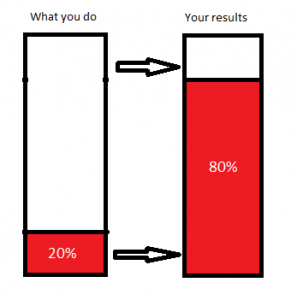Lisa’s tips for productivity and prioritising
I find swimming a really good way of clearing my head and focussing on what I need to get done. Yesterday I went for a swim and thought about all my day to day tasks which I wrote down after I finished and was able to action. This meant that today my head is clearer, so I can start to focus on bigger picture stuff.
I have a mantra of 80/20, which is about doing stuff even though it isn’t perfect. The mantra asserts that 20% of our efforts should produce 80% of our results, so the other 80% of our efforts will only produce 20% of our results, so it isn’t worth putting in that extra 80% effort- it isn’t worth trying to be perfect. For example, I’m posting this video within this blog despite the fact that I haven’t tidied up my office, as it isn’t worth putting in that extra effort for only a slightly better result. This principle could really help my perfectionist friends, who struggle to complete as many tasks, by reassuring them that they should produce results that aren’t perfect.

I use a Steven Covey matrix, a time management tool for dealing with being overwhelmed with To-Do lists. This splits tasks into 4 quadrants: important urgent, not important urgent, important not urgent, not important not urgent.
For example, getting the drawings ready for the meetings today and job admin with a deadline is in the important urgent category.
Updating internal documents such as privacy documents is important and urgent.
You need to be careful with what you classify as urgent or important, as clients, suppliers or builders may make it seem like some tasks are urgent, but they are actually working to their own timescales so these tasks may not be important or urgent even though they may seem to be.
Creating a marketing plan is important not urgent.
Booking in discovery days is about growing my franchise long term, so it is important not urgent.
Booking a holiday, I originally put in the not important not urgent category, but I moved it to the important not urgent category, as I need a break.
This system allows me to see which tasks are important and which I need to do on that day, and it allows me to focus on those important not urgent items, one at a time.

The advice from the book Eat That Frog! By Brian Tracy, is really useful. It talks about doing the biggest and worst task first to get it out of the way. This makes sure you don’t forget about them, are doing about them when you are fresh and not tired, and you have done them before problems have arisen.
